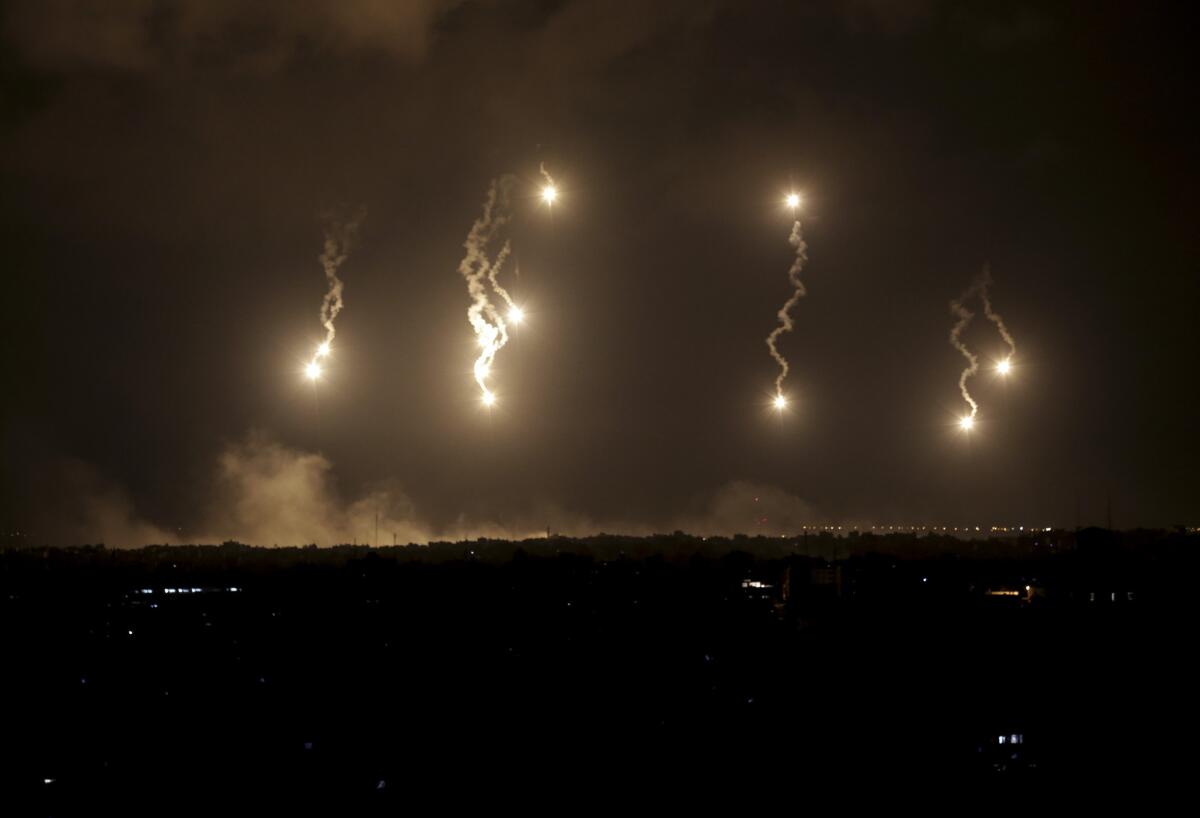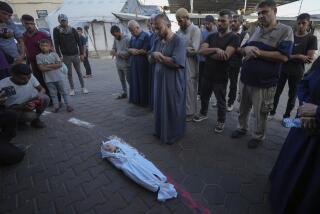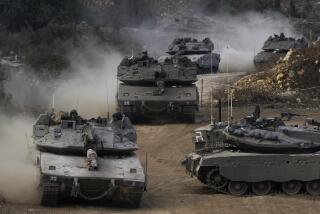Israeli ground forces push deeper into Gaza Strip

Reporting from Gaza City — Shells slammed into densely populated neighborhoods. Families wept over bloodied corpses and medical workers rushed to keep up with the wounded Friday as Israeli forces hunted rocket launchers and tunnels that Palestinian militants use to strike Israel.
Troops backed by tanks and artillery pressed deeper into the coastal enclave in a ground offensive launched Thursday after 10 days of aerial bombardments failed to halt the rocket fire raining down on Israel’s cities and towns from Gaza, which has been controlled by Hamas since 2007.
Israel has launched previous campaigns, including a major ground operation early in 2009. Each time, Hamas has quickly rebuilt its arsenal of rockets, which have grown more powerful and can now penetrate deep into Israeli territory.
Hard-liners in Israel have been calling for an all-out assault to drive Hamas from power. This incursion appeared more limited in scope, targeting a network of tunnels along the enclave’s northern, eastern and southern frontiers that militants use to smuggle weapons and fighters into Israel.
But Prime Minister Benjamin Netanyahu told reporters he had instructed the military to prepare for the possibility of a “considerable expansion of the ground operation.”
“We chose to embark on this operation after exhausting the other options and with the understanding that without the operation, we could pay a much higher price,” Netanyahu said as he headed into a meeting of his Security Cabinet.
More than 1,600 rockets have been fired at Israel since July 8, according to Israeli authorities. The country’s Iron Dome antimissile system, built with U.S. assistance, has helped keep Israeli casualties to a minimum. One Israeli was killed by shelling from Gaza, and an Israeli soldier was killed during the ground operation. The cause of the military death was under investigation, but Israeli news reports said that friendly fire was suspected.
Nearly 300 Palestinians have been killed, most of them civilians, by Israeli airstrikes and ground attacks, according to Gaza medical officials quoted by the Maan news agency. More than 60 of them died since the ground operation began.
Heavy fighting was reported in the northern Gaza cities of Beit Hanoun and Beit Lahiya, as well as around Khan Yunis and Rafah to the south.
Among the Palestinians killed Friday were three siblings ages 13 to 15 who died when their house in Beit Lahiya was shelled. A separate attack killed at least eight members of an extended family in Khan Yunis, according to Palestinian accounts.
Loud explosions resonated throughout the day, sending families living in Gaza’s frontier areas fleeing toward the interior on foot and in donkey carts.
Others, however, were afraid to leave their homes.
“Where to go?” lamented Sharhabeel Mahmoum, a 37-year-old pharmacist and father of four reached by telephone in Beit Lahiya. “As long as Israeli planes are in the air, there is no safe place.”
Ambulances cruised the streets searching for victims. A distraught man arrived at the Shifa hospital in Gaza City with two young children, their faces peppered with shrapnel wounds. In the hospital morgue, relatives grieved over the body of a woman covered with a soiled sheet.
Constant bombardment has made life miserable in the impoverished enclave, knocking out already patchy power and water service and keeping families pinned down in their homes.
Bodour Kwaik, a 24-year-old aid worker, lost two family members in an Israeli airstrike early in the campaign. “I couldn’t even say good-bye,” she said from her Gaza City apartment. “I couldn’t go to the funeral because it was too risky.”
Israeli military officials said the complex network of tunnels through the Gaza Strip remains a potent threat, linking weapons caches and rocket launch-sites with homes and mosques used by militants to strike at Israel.
“There appears to be some misunderstanding of how severe the tunnel threat really is,” said retired Maj. Gen. Gadi Shamni, a former commander of the Israel Defense Forces’ Gaza Division. “A successful attack through such a tunnel … can turn everything around.”
Before the ground offensive began Thursday, Israeli officials said they intercepted 13 heavily armed fighters at the mouth of a tunnel in Israel. An airstrike is believed to have killed three of them, but the rest escaped, said Lt. Col. Peter Lerner, an Israeli military spokesman.
A similar tunnel was used to capture an Israeli soldier, Gilad Shalit, in 2006. He was held for five years, until Hamas agreed to release him in exchange for more than 1,000 Palestinian prisoners .
Israeli troops have uncovered 10 tunnels with 22 exit points across the Gaza Strip since launching the ground operation, trading fire with Palestinian militants who attacked with guns and rocket-propelled grenades, military officials said. At least 17 militants were killed and 21 captured since the start of the ground operation, the military said.
Hamas called the decision to launch the ground operation dangerous, and threatened in a statement to “drown the occupation army in Gaza mud.”
The sharp escalation in the fighting came despite growing international pressure on the two sides to suspend hostilities.
President Obama said he reaffirmed his support for Israel’s right to defend itself in a telephone conversation with Netanyahu Friday.
“No nation should accept rockets being fired into its borders, or terrorists tunneling into its territory,” Obama told reporters. “In fact, while I was having the conversation with Prime Minister Netanyahu, sirens went off in Tel Aviv.”
But Obama said he made it clear that the United States and its allies were deeply concerned about the risk of further escalation and the loss of more innocent lives. U.S. Secretary of State John F. Kerry is working to support Egyptian mediation efforts and is prepared to travel to the region after additional consultations, Obama said.
Israeli officials say they send repeated warnings to residents before launching attacks in their areas. Netanyahu told Obama that he holds Hamas responsible for the harm done to civilians, accusing the group of using them as human shields, according to a statement from the prime minister’s office.
Israel accepted an Egyptian cease-fire proposal this week that called on the parties to wind down the fighting and send negotiators to Cairo to hammer out a more permanent truce.
But Hamas leaders, who have found themselves increasingly isolated since the ouster of Egypt’s Islamist president, Mohamed Morsi, said their fighters wouldn’t back down until key demands are met. They include easing a crippling blockade on the impoverished territory, reopening border crossings into Israel and Egypt, and releasing their members jailed in the West Bank during recent sweeps spurred by the disappearance and slaying of three Israeli teens.
There appeared to be widespread support for the government campaign in Israel, where residents of many southern communities have spent much of the last 11 days running to shelters as rockets arched through the sky.
Irit Esman, a 47-year-old flight attendant who lives in the southern Israeli city of Rehovot, spent Thursday night in her living room with two teenagers so they could make it to the nearest bomb shelter in time if the air-raid sirens sounded.
“Unfortunately, I don’t think Israel had a choice other than to launch the ground operation,” she said. “Israel’s southern communities have suffered a 14-year war of attrition by rockets.... It’s unthinkable that a terror organization shunned by the world can just disrupt the daily life of millions and terrorize an entire country.”
Parents with children serving in the Israeli military shared their fear in a grocery store outside Jerusalem, asking each other, “Have you heard from them? Do you know whether they went in? They took away their cellphones?”
A father waited outside in tears. He couldn’t reach his son.
Times staff writer Zavis reported from Ashkelon, special correspondent Sobelman from Jerusalem and Times staff photographer Carolyn Cole from Gaza City. Special correspondents Rushdi abu Alouf and Abeer Ayyoub in Gaza City contributed to this report.
For more news from Israel and the Gaza Strip, follow @alexzavis on Twitter
More to Read
Sign up for Essential California
The most important California stories and recommendations in your inbox every morning.
You may occasionally receive promotional content from the Los Angeles Times.











